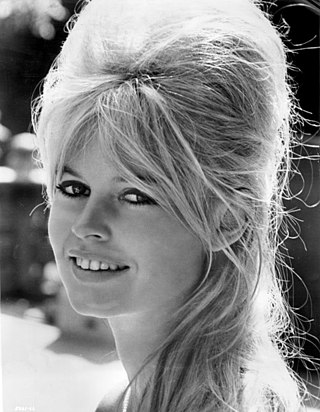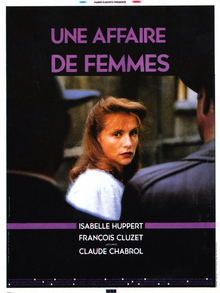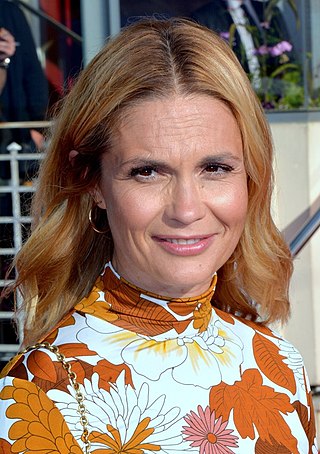Related Research Articles

Brigitte Anne-Marie Bardot, often referred to by her initials B.B., is a French former actress, singer, and model as well as an animal rights activist. Famous for portraying characters with hedonistic lifestyles, she is one of the best known symbols of the sexual revolution. Although she withdrew from the entertainment industry in 1973, she remains a major pop culture icon. She has acted in 47 films, performed in several musicals, and recorded more than 60 songs. She was awarded the Legion of Honour in 1985.

Sidonie-Gabrielle Colette, known mononymously as Colette, was a French author and woman of letters. She was also a mime, actress, and journalist. Colette is best known in the English-speaking world for her 1944 novella Gigi, which was the basis for the 1958 film and the 1973 stage production of the same name. Her short story collection The Tendrils of the Vine is also famous in France.

Rosemarie Magdalena Albach, known professionally as Romy Schneider, was a German-French actress. She is regarded as one of the greatest screen actresses of all time and became a cult figure due to her role as Empress Elisabeth of Austria in the Sissi trilogy in the mid-1950s. She later reprised the role in a more mature version in Luchino Visconti's Ludwig (1973). She began her career in the German Heimatfilm genre in the early 1950s when she was 15. Schneider moved to France, where she made successful and critically acclaimed films with some of the most notable film directors of that era. Coco Chanel called Romy “the ultimate incarnation of the ideal woman.” Bertrand Tavernier remarked: “Sautet is talking about Mozart with regard to Romy. Me, I want to talk of Verdi, Mahler…”

Nicole Françoise Florence Dreyfus, known professionally as Anouk Aimée or Anouk, was a French film actress who appeared in 70 films from 1947 until 2019. Having begun her film career at age 14, she studied acting and dance in her early years, besides her regular education. Although the majority of her films were French, she also made films in Spain, the United Kingdom, Italy and Germany, along with some American productions.

Jean-Louis Xavier Trintignant was a French actor. He made his theatrical debut in 1951, and went on to be regarded as one of the best French dramatic actors of the post-war era. He starred in many classic films of European cinema, and worked with many prominent auteur directors, including Roger Vadim, Costa-Gavras, Claude Lelouch, Claude Chabrol, Bernardo Bertolucci, Éric Rohmer, François Truffaut, Krzysztof Kieślowski, and Michael Haneke.

A Man and a Woman is a 1966 French romantic drama film directed by Claude Lelouch and starring Anouk Aimée and Jean-Louis Trintignant. Written by Pierre Uytterhoeven and Lelouch, the film concerns a young widow and widower who meet by chance at their children's boarding school and whose budding relationship is complicated by the memories of their deceased spouses. The film is known for its lush photography, which features frequent segues among full color, black-and-white, and sepia-toned shots, and for its music score by Francis Lai.
Marie Trintignant was a French film and stage actress. She appeared in over 30 movies during her 36-year career. Her family was deeply involved in France's film industry, as her father was an actor and her mother was a director, producer, and screenwriter.
Noir Désir was a French rock band from Bordeaux. They were active during the 1980s, 1990s and early 2000s, and have had two albums certified double platinum in France and three certified gold. They have been an influence on numerous French musicians including Cali, Louise Attaque and Miossec. While active, the band consisted of Bertrand Cantat, Serge Teyssot-Gay (guitar), Jean-Paul Roy and Denis Barthe (drums).

Bertrand Lucien Bruno Cantat is a French songwriter, singer, and convicted murderer known for being the former frontman of the rock band Noir Désir. In 2003, he was proven guilty without a doubt and convicted of the murder of French actress Marie Trintignant, which occurred in a hotel room in Vilnius. To some controversy, Cantat returned to Noir Désir after his release from prison in 2007, playing with the group until it disbanded in 2010. He subsequently formed a musical duo with Pascal Humbert, calling themselves Détroit.

Marie-José Benhalassa, known professionally as Marie-José Nat, was a French actress. Among her notable works in cinema were the sequel films Anatomy of a Marriage: My Days with Jean-Marc and Anatomy of a Marriage: My Days with Françoise (1963), directed by André Cayatte. In 1974, she received a Cannes Film Festival Award for Best Actress for her performance in the film Violins at the Ball.

Dominique Marie-Françoise Renée Varaigne professionally known as Dominique Sanda, is a French actress.

Nadine Trintignant is a French filmmaker and novelist. She is known for making films that surround the topic of family and relationships, such as Ça n'arrive qu'aux autres and L'été prochain. Her film Mon amour, mon amour was nominated for the Palme d'Or at the 1967 Cannes Film Festival.

My Wife is an Actress is a 2001 French romantic comedy-drama film starring Yvan Attal and Charlotte Gainsbourg. Attal plays a journalist who becomes obsessively jealous when his actress wife gets a part in a movie with an attractive co-star. Attal also wrote and directed the film. The film stars Terence Stamp among others. This film is also highly biographic, as Yvan and Charlotte are a real-life couple since 1991, and have three children. According to Yvan, the idea and a part of the plot originates from real-life events.

Story of Women is a 1988 French drama film directed by Claude Chabrol, based on the true story of Marie-Louise Giraud, guillotined on 30 July 1943 for having performed 27 abortions in the Cherbourg area, and the 1986 book Une affaire de femmes by Francis Szpiner.

Catherine Jacob is a French film and theatre actress who has won a César Award for her role in Life Is a Long Quiet River (1988), and was nominated for Best Supporting Actress in Tatie Danielle (1990), Merci la vie (1991) and Neuf mois (1994). She has been two-time president of the Lumières Award. She is known for her voice and her charisma.
The Manifesto of the 343 Women is a French petition penned by Simone de Beauvoir, and signed by 343 women, all publicly declaring that they had had an illegal abortion. The manifesto was published under the title, "Un appel de 343 femmes", on 5 April 1971, in issue 334 of Le Nouvel Observateur, a social democratic French weekly magazine. The piece was the sole topic on the magazine cover. At the time, abortion was illegal in France, and by admitting publicly to having aborted, women exposed themselves to criminal prosecution.

A Man and a Woman: 20 Years Later is a 1986 French drama film directed by Claude Lelouch and is a sequel to Lelouch's 1966 film Un homme et une femme. It was screened out of competition at the 1986 Cannes Film Festival. A follow-up to both films, The Best Years of a Life, again starring Trintignant and Aimee, was released in 2019.

Barbara Schulz is a French actress who won the Prix Suzanne Bianchetti in 2001. She was nominated for the César Award for Most Promising Actress for the 1999 film La Dilettante.
Nicole Lubtchansky was a French film editor who worked primarily with director Jacques Rivette. She edited twenty of Rivette's films, starting with 1969's L'amour fou and concluding with 2009's Around a Small Mountain. In between, Lubtchansky edited such acclaimed Rivette films as Celine and Julie Go Boating, Love on the Ground and La Belle Noiseuse.
References
- ↑ "Marie Trintignant, 41". The Washington Post . 2 August 2003. Archived from the original on 10 June 2022. Retrieved 10 June 2022.
- ↑ "Obituary: Marie Trintignant". The Guardian . 2 August 2003. Archived from the original on 2 March 2018. Retrieved 10 June 2022.
- ↑ Tagliabue, John (5 August 2003). "Brutal Death of an Actress Is France's Summertime Drama". The New York Times . Archived from the original on 20 March 2022. Retrieved 10 June 2022.
- ↑ "Marie Trintignant, 41; French Film and Stage Actress". Los Angeles Times . Associated Press. 2 August 2003. Archived from the original on 10 June 2022. Retrieved 10 June 2022.